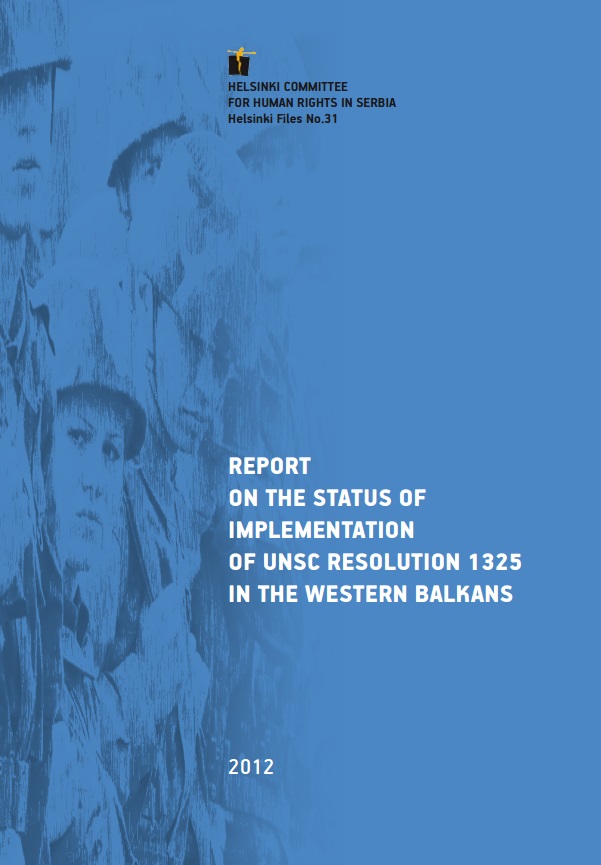
We kindly inform you that, as long as the subject affiliation of our 300.000+ articles is in progress, you might get unsufficient or no results on your third level or second level search. In this case, please broaden your search criteria.

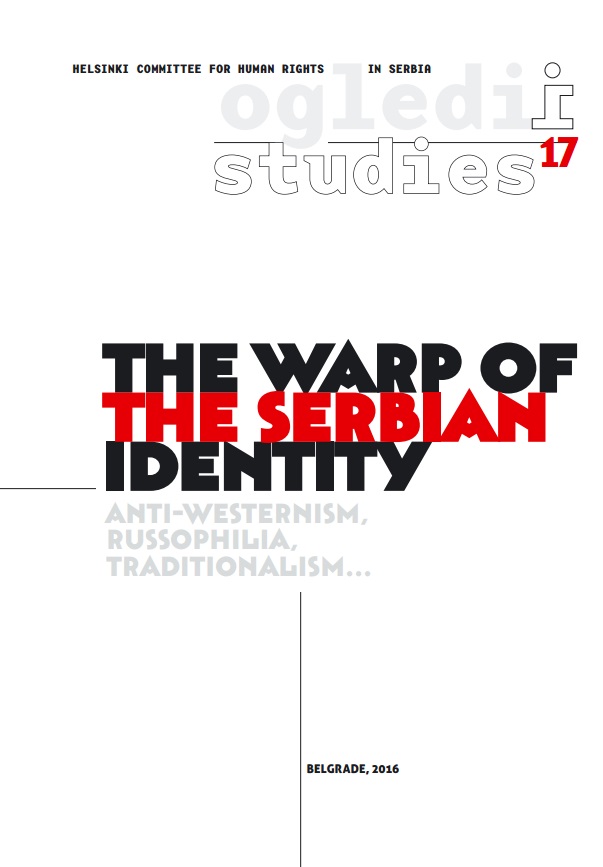
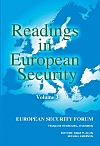
Iran: The Moment of Truth. A European Perspective (by François Heisbourg) Influence, Deter and Contain – The Middle Path for Responding to Iran’s Nuclear Programme. An American Perspective (by Patrick Clawson) Iran’s Nuclear Programme. A Russian Perspective (by Vladimir Sazhin)
More...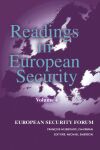
Chairman’s Summing-up (by François Heisbourg) | ‘Afghanistan-lite’: The Crunch (by Julian Lindley-French) | Lessons from Soviet Experiences of Socialist Modernisation in Afghanistan (1978–89) (by Andrei Zagorski) | Afghanistan 2007: Problems, Opportunities and Possible Solutions (by Peter Bergen) | Strategic and Operational Measures to Curb the Growing Threat of Suicide Terrorism in Afghanistan (by Hekmat Karzai) | Afghanistan: Mission impossible? The Pakistani Perspective (by Ismail Khan)
More...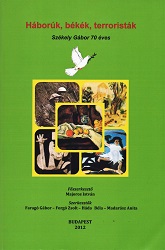
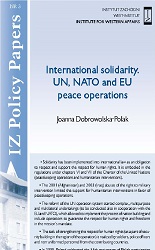
The moral obligation of solidarity – present in every religion – and the wayit functions in the relations between states, nations and people belongingto foreign ethnic, national and religious groups, have been discussed in theinternational arena for several years.The rule of solidarity is an ethical imperative that gives the right and imposesthe obligation to act whenever a human being experiences harm thataffects his mental and physical well-being or threatens his life. Accordingto John Paul II, “Solidarity is (…) a firm and persevering determination tocommit oneself to the common good; that is to say to the good of all and ofeach individual, because we are all really responsible for all”1. Tenzin Gjaco,the 14th Dalai Lama of Tibet says that when people demand the rights andfreedoms they cherish, they should not also forget about responsibilitiesthey have towards other people. “If we accept that others have an equal rightto peace and happiness as ourselves do we not have a responsibility to helpthose in need?”2. He claims that if we close our eyes to the suffering of othersto enjoy our freedom and success, we reject the responsibility. That is why it isabsolutely necessary to develop interest in the problems of others - individualsand entire nations3.
More...
Is NATO, which has been in existence for over 60 years, still the fundamental political and military structure guaranteeing security and stability in Europe - as it has been for decades? To what extent should the Pact be an element and factor of security on a global scale - what do the challenges of today require? Can NATO still operate effectively and be a credible alliance in the current conditions and in the face of new threats? These are some of the questions that should be asked before we begin to develop a new strategic doctrine for the Alliance. This, in turn, must resolve several fundamental issues that are important for making NATO more dynamic and getting it out of a critical juncture.
More...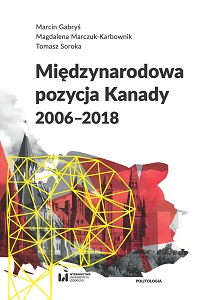
The book Międzynarodowa pozycja Kanady (2006-2018)] [International position of Canada (2006-2018)] consists of three chapters written by three different scholars. Each chapter identifies and analyzes specific factors that have determined the position Canada holds in the contemporary international relations. The first chapter is devoted to the assessment of Canada's foreign policy during Stephen Harper’s prime ministership (2006-2015). This part of the book distinguishes and analyzes four basic elements of Stephen Harper's foreign policy doctrine: the need to keep a broad conservative coalition and to include the values and interests of this group of voters (as well as the personal views of the prime minister) in the formulation of foreign policy; the emphasis on the need to increase the role of the military sphere in building the international position of Canada; the redefinition of Ottawa's attitude to multilateralism; the importance of the economic sphere of international relations, especially international trade and the export of Canada’s natural resources, particularly energy resources. The second chapter is focused on the most contemporary Canadian foreign policy, as it was conducted by the Justin Trudeau government in the years 2015-2018. The chapter presents both the main theoretical assumptions of the Trudeau foreign policy doctrine and its practical implementation in such spheres of external policy as Canada's activity in the fora of multilateral international organizations, particularly in the contexts of peace-building and peacekeeping, immigration and refugee policies and bilateral economic relations between Canada and the U.S. The third chapter analyzes Canadian foreign policy towards Central and Eastern Europe between 2014 and 2018. The chapter proves that firm attitude towards Russia (especially sharp rhetoric and imposition of economic sanctions), military engagement within NATO and its reassurance measures in promoting security in Central and Eastern Europe, political, financial and military support for Ukraine, and closer cooperation with Poland can be considered as good exemplifications of Harper`s doctrine in Canadian foreign policy. The large Polish and Ukrainian diasporas in Canada, and their influence on politics in Ottawa is a very important factor as well. The Liberal government of Justin Trudeau has different foreign policy goals – it regards the necessity of a political dialog with Russia in other fields. However, Trudeau declares willingness to prolong supporting measures for Ukraine and commitment to NATO.
More...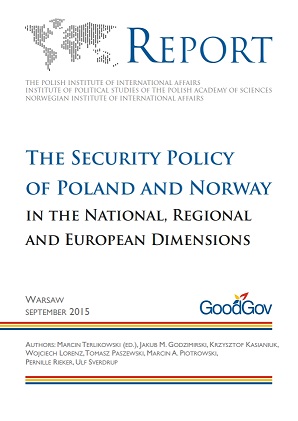
Notwithstanding considerable differences in geography and in economic and demographic potential, Poland and Norway are close security policy partners, with their cooperation in the field resting on a solid foundation of similar threat perceptions and well-defined strategic interests, shared by both countries. The most important of those interests is to keep the North Atlantic Alliance strong and able to effectively provide security to member states, primarily through the credible capability of direct defence of their territories, and then later through crisis-management operations and cooperative security. It is precisely within the NATO framework and at the political level that the Polish-Norwegian cooperation has grown most dynamically, especially with increasing instability in the European security environment following the outbreak of the Russia-Ukraine conflict. And yet, the potential for closer collaboration between Poland and Norway and for sharing one another’s experiences is much larger than current practice would indicate. The present report analyses key aspects of Polish and Norwegian security policy, where both countries could benefit from the other party’s good practices and experience, and where they could establish closer cooperation. The research covers areas representing three broad dimensions of security policy: national, regional and European. These are also the three levels of governance, as they are proposed in the methodological framework of the GoodGov project.
More...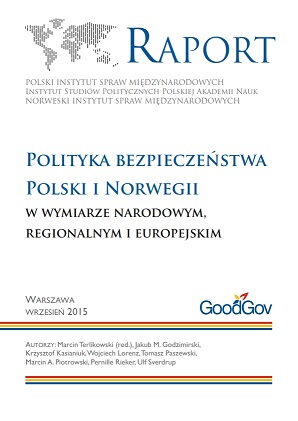
Pomimo dzielących Polskę i Norwegię istotnych różnic – wynikających choćby z położenia geopolitycznego oraz odmiennych potencjałów ekonomicznych i ludnościowych – oba państwa są bliskimi partnerami w dziedzinie polityki bezpieczeństwa. Ich współpraca opiera się na mocnym fundamencie, utworzonym przez podobną percepcję zagrożeń dla Europy oraz dobrze zdefiniowane, wspólne dla obu krajów interesy strategiczne. Najważniejszym z nich jest utrzymanie silnego Sojuszu Północnoatlantyckiego, zdolnego do zapewnienia bezpieczeństwa państwom członkowskim, przede wszystkim poprzez wiarygodną zdolność do bezpośredniej obrony ich terytoriów, a dopiero w następnej kolejności przez zagraniczne operacje reagowania kryzysowego i współpracę polityczną (bezpieczeństwo kooperatywne). Właśnie w ramach NATO, a zarazem na poziomie politycznym, oba państwa współdziałają ze sobą najintensywniej, zwłaszcza w sytuacji wzrostu niestabilności europejskiego środowiska bezpieczeństwa, zapoczątkowanego konfliktem rosyjsko-ukraińskim. Jednak potencjał współpracy Polski i Norwegii oraz ich wzajemnego uczenia się od siebie nie jest jeszcze w pełni wykorzystany. W raporcie przeanalizowano najważniejsze problemy polskiej i norweskiej polityki bezpieczeństwa, w których rozwiązaniu mogłoby obu państwom pomóc wzajemne czerpanie ze swoich doświadczeń lub podjęcie ściślejszej współpracy. Do badań wybrano zagadnienia reprezentujące trzy podstawowe wymiary polityki bezpieczeństwa: narodowy, regionalny oraz europejski i transatlantycki; są to zarazem trzy poziomy rządzenia wyróżniane w metodologii projektu „GoodGov”.
More...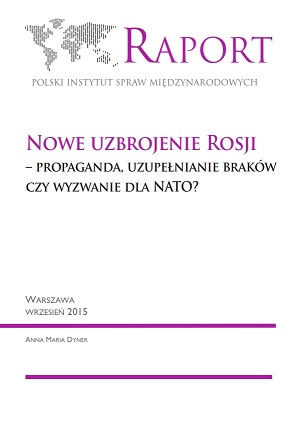
In recent years, Russia has intensified work on new types of weapons for all parts of its Armed Forces. By introducing the new weapon types, Russia wants to base its strength not only on its nuclear forces, which in many cases is completely ineffective as a deterrent, but also on conventional forces. This goal has resulted in the need to replace obsolete equipment and has been financed by the economic prosperity of the country, thanks mainly to high oil prices. With the higher inflows to the country’s budget, Russian authorities managed to increase funds for rearmament. The current economic crisis, however, and in particular the fall in the price of crude oil, the sales of which form the base revenue of Russia’s budget (amounting to about 45%), may result in a loss of funding for the rearmament programmes. The plans may be further limited by technological deficiencies in Russia’s military industry, exacerbated by sanctions introduced by the EU and U.S. in response to Russia’s actions in Ukraine and which prevent the acquisition of Western technology, especially military-grade electronics. In the short- and medium-term perspectives, Russia’s financial problems may result in the need to select priority technologies and choose between the armed forces that will be equipped first. Considering the amount of new equipment introduced by Russia and ongoing research projects on new types of weapons, the most important is the Russian Air and Space Forces, as well as its Strategic Rocket Forces. The country will also invest in weapons for ground troops and naval aviation. A number of changes will also affect the navy, but in this case the reason is mainly the poor technical condition of Russian Federation assets.
More...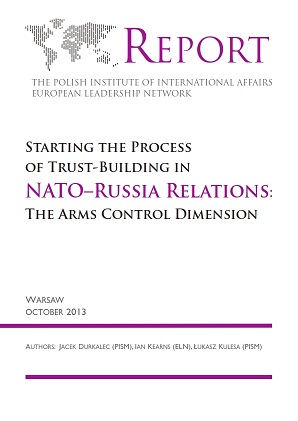
The security climate in Europe has chilled considerably. While we are far from a threat of a military confrontation, worst-case assumptions are frequently being made about the intentions of “the other.” A fundamental change of the climate of the relationship is possible if the West and Russia work together to increase mutual trust in the military field. Trust-building in the anarchic international environment is inherently difficult, but three approaches stand out: graduated reciprocation (a sequence of limited conciliatory steps), costly signals (bold concessions aimed at showing trustworthiness), and reliance on inter-personal dynamics, especially contacts between leaders. In the NATO–Russia context, only a combination of these three approaches aimed at reaching specific, realistically selected arms control aims can bring about notable progress. Mutual restraint and increased transparency should be the guiding principles.
More...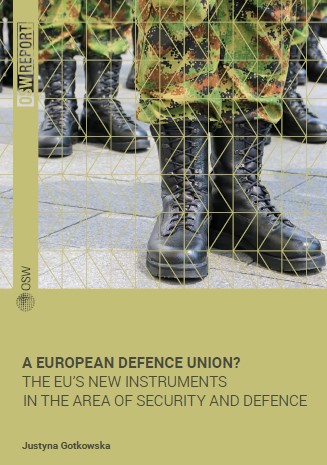
This report aims to present the evolution of the EU’s security and defence policy since 2016. Public debate on this issue often comes down to slogans about a ‘European army’, which in reality no‑one intends to create, or ‘European strategic autonomy’, a concept which has no clear definition. Discussions on the EU’s security and defence policy are much less often based on actual knowledge of the activities the EU is undertaking in this area, or the interests of individual actors.
More...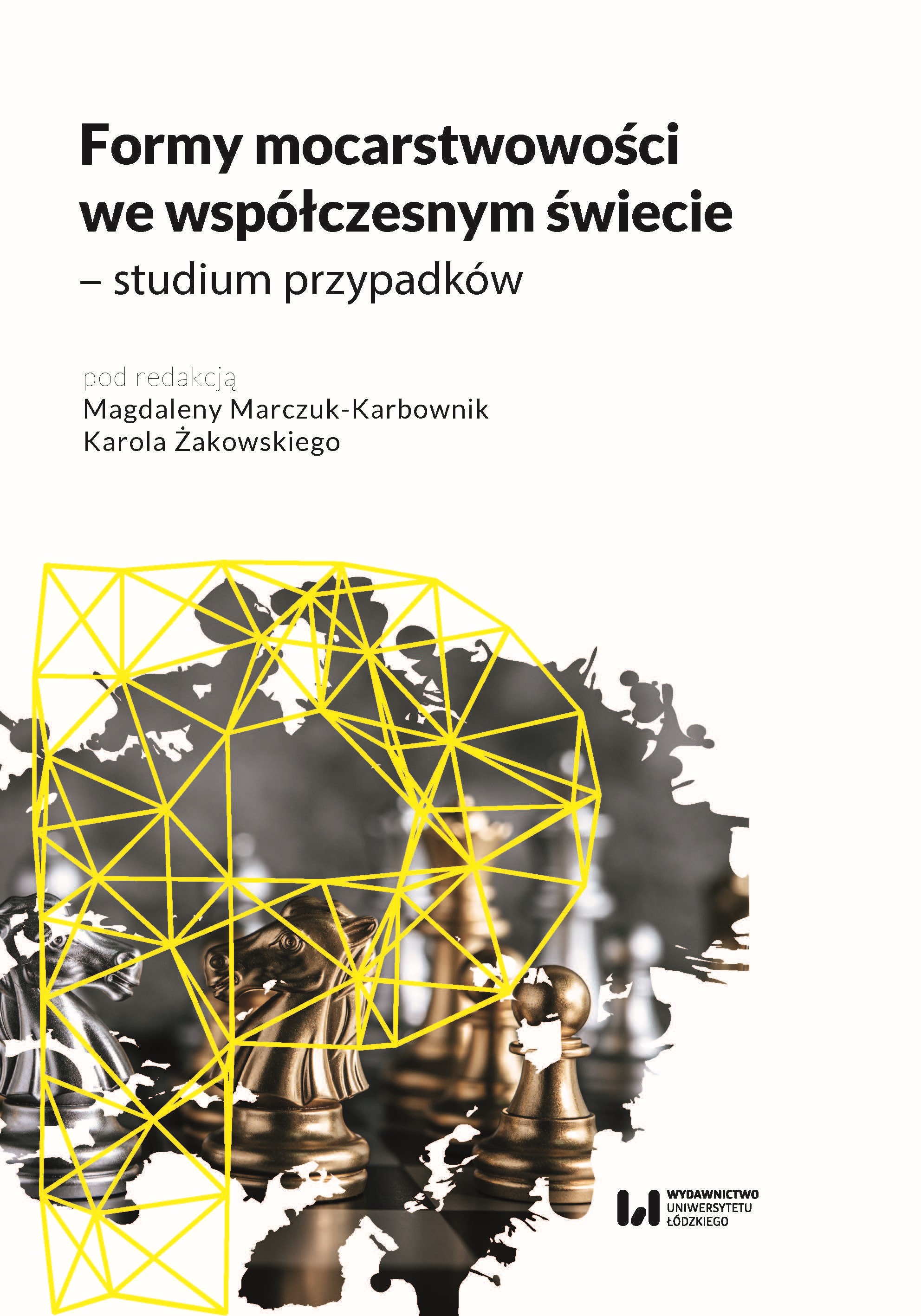
The monograph analyzes the military, economic and political power of selected countries. It contains case studies especially on those actors of international relations who either aspire to the role of great powers or have come to terms with their rank of "middle power". The potential of the European Union or India predestines them to strive for a place among the most significant actors on the international arena. Japan, Canada and South Korea, in turn, being aware of the limits of their power, focus rather on strengthening the existing international order or balancing between great powers.
More...
In April 1941, during the fragile lull between the Finnish Winter War and the Continuation War, an inconspicuous book signed under the pseudonym Nauticus saw the light of day. This Finnish-language work, first published in Sweden, was added to the list of banned books shortly after the war and did not return to the shelves of shops and libraries until almost 70 years later, this time under the author’s real name. In his comprehensive, openly anti-Soviet reportage, Mika Waltari describes the conditions prevailing in the Baltic countries in the period between the autumn of 1939 and the summer of 1940, when Lithuania, Latvia and Estonia were struggling against the ever-increasing influence of the Soviet Union, and the subsequent fall of all three countries into its vassalage. The author makes full use of his journalistic experience and extraordinary literary talent, and his ability to tell compelling stories. The book is complemented not only by excerpts from propaganda materials and speeches by state officials, but also by contemporary political anecdotes, which underline the ironic and sometimes almost bittersweet character of the otherwise straightforward text. The book is an invaluable testimony of the situation in the Baltic states when these countries were shrouded in darkness and isolated from the rest of the world. Waltari’s gloomy testimony thus becomes another piece in the mosaic of European war history.
More...
The NATO aggression against the Federal Republic of Yugoslavia in 1999 is one of the most tragic episodes in the modern history of the Serbian people. In military terms, this conflict was almost absurd: the largest military coalition in history attacked a small and isolated country with a genuine threat to destroy it utterly. From the political and cultural point of view, this conflict brought to Serbia besides terrible destruction and numerous victims, a profound disappointment because the war was initiated by its former allies from the two great world wars. During the 20th century, in the First Balkan War and the First and Second World War, Serbia mainly fought against far superior enemies (the Ottoman Empire, the Austro-Hungarian Empire, Imperial Germany and later Nazi Germany) but always with a strong motive of freedom in the foreground. Serbia emerged as a winner and part of the winning alliances from all these conflicts. In so far, the military attack of the nineteen NATO member states on Serbia, i.e., the former FR Yugoslavia (the remaining federation of Serbia and Montenegro after the dissolution of the “Great Yugoslavia”), conducted by an alliance of some major allies from the previous wars (France, United Kingdom, USA), represented an enormous civilizational shock to the Serbian people. It was hard to comprehend and accept the ideological, political and “humanitarian” reasons declared by the Western allies as justification for their warfare. From this perspective, it can be stated that the fallen members of the Yugoslav Army and the Ministry of the Interior of Serbia demonstrated heroism and courage equal to those of their ancestors who fought in the previous wars for freedom and honor of the homeland. On the occasion of two decades of this, for many reasons, a unique war in military history, the Faculty of Security Studies of the University of Belgrade and the Institute of International Politics and Economics from Belgrade decided to publish the international thematic collection of scientific papers.
More...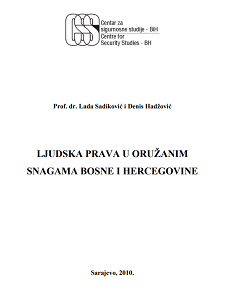
Ratifikacijom Evropske konvencije za zaštitu ljudskih prava 12. Jula 2002. godine država Bosna i Hercegovina se obavezala da će svim licima pod njenom jurisdikcijom osigurati sva ljudska prava i osnovne slobode sadržane u Konvenciji i protokolima uz nju. Ova obaveza države Bosne i Hercegovine podrazumijeva naravno i zaštitu ljudskih prava za sve pojedince pod njenom jurisdikcijom, bez obzira na to kojim društvenim sferama ili oblicima organiziranja pripadaju. To znači da pored svih onih ljudskih prava koja se jednako odnose na sve pojedince pripadnike bosanskohercegovačkog društva postoje i oblasti djelovanja koje po svojoj prirodi ne omogućavaju takvu jedinstvenu primjenu i zaštitu ljudskih prava. Jedna od takvih kategorija svakako su ljudska prava u oružanim snagama. Naime, pojedinci pripadnici oružanih snaga imaju sa jedne strane sva prava i osnovne slobode iz Evropske konvencije ali, sa druge strane, usljed specifične prirode i karaktera profesije koju obavljaju nužno imaju i brojna ograničenja tih ljudskih prava. Normalno je predpostaviti da se u Oružanim snagama BiH, s obzirom na visok stepen subordinacije i centralizacije te funkcije, neće moći osigurati sva ona ljudska prava koja su karakteristična za pripadnike u različitim oblicima civilnih djelatnosti. Delikatnost našeg zadatka upravo je u tome da se na skladan način pomire i sintetiziraju ljudska prava koja pripadaju svim pojedincima i obaveza njihove restrikcije koja proizlazi iz karaktera vojne djelatnosti. Sukladno praksi savremenih evropskih država postoji potreba da se za pojedince i u toj sferi društvenog djelovanja osiguraju ona ljudska prava koja je moguće u tim uvjetima ostvariti a da se istovremeno, ni na koji način ne naprave zapreke uspješnom djelovanju oružanih snaga u ostvarivanju njihove odbrambene funkcije. Polazeći od navedenog, cilj istraživanja je da se u Bosni i Hercegovini takođe istraži odnos između slobode pojedinca – pripadnika Oružanih snaga Bosne i Hercegovine i potrebe da se uspješno ostvaruje osnovna zadaća Oružanih snaga Bosne i Hercegovine. Ovaj zadatak posebno je suptilan zbog toga, što se prvi put u Bosni i Hercegovini uveo princip profesionalnih oružanih snaga umjesto ranije klasične vojne obaveze. Ovom prilikom svakako, imat će mo u vidu iskustva razvijenih demokratskih zemalja Evrope, koje su i u ovom smislu postigle već određene rezultate i izvršile određena istraživanja u uvjetima postojanja oružanih snaga i ljudskih prava za pojedince koji vrše tu funkciju. To znači, da će biti tretirane uglavnom one oblasti ljudskih prava koje su već istražene u evropskim državama u namjeri da se ukaže na specifičnosti i posebnosti naše situacije. Najmarkantnija specifičnost naše situacije u ovoj oblasti jeste da se oružane snage ne spominju u Ustavu Bosne i Hercegovine (Aneks 4 Općeg okvirnog sporazuma za mir u BiH) nego u Aneksu 2 tog Sporazuma. Svakako da će predstojeće ustavne promjene dovesti i do ustavnog normiranja oružanih snaga. Međutim, ovo istraživanje bit će usmjereno na sadašnje stanje, bez obzira na okolnost što se u Daytonskom mirovnom sporazumu razdvaja implementacija vojnog dijela mirovnog sporazuma od tzv. civilne implementacije toga Sporazuma i postojanja Visokog predstavnika međunarodne zajednice koji je zadužen za tu oblast prema Aneksu 10 Daytonskog mirovnog sporazuma.
More...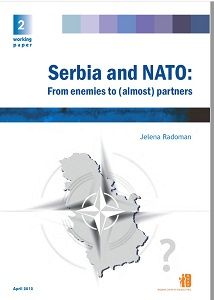
This paper explores the ambivalence of current Serbia – NATO relations. The relationship features alongside Serbia’s ‘exceptionality’ in comparison to the relations of the other Western Balkan countries with the Alliance. In spite of this ‘exceptionality’ Serbia’s security policies have being brought in line with the prevailing security discourse and concept of NATO. The main event that has shaped Serbia – NATO relations is the 1999 bombing campaign of which its consequences and impact on current Serbia – NATO relations are described and analysed here. The central argument is that despite the experience of NATO’s hard power in 1999, Serbia’s security policies have been socialised through the post-1999 engagement with the Alliance as well as the perceived convergence of NATO’s and the European Union’s security policies. This case study contributes to the literature on socialisation by analysing an exceptional case of socialisation which took place without Serbia either being a member of the EU or NATO, or any sort of declared ambition to join the Alliance. It stands in contrast to the already explored examples of socialisation of the Central and East European, Baltic and Balkans states whose security policies have been socialised due to these countries’ open and undisputed ambitions to join both the EU and NATO and their following admittance into both of these organizations.
More...
The book Protection of Human Rights in the Army and the Police combines the papers prepared by the researchers and associates of the Centre for Civil-Military Relations, a Belgrade-seated NGO, within a project on the “Protection of Human Rights in the Army and the Police of the FR of Yugoslavia”. The whole project, including the publishing effort, was implemented with the support of the Westminster Foundation for Democracy, London and Freedom House, Budapest. The project, initially conceived as one-year (2000-2001) interdisciplinary research exercise, was essentially aimed at identifying the degree of respect for human rights in the Yugoslav army and the police. The research also extended to the observance of human rights of citizens under the jurisdiction of the army and/or the police. The main task of the researchers was to look into the (im)balance between the regulative – constitutional and legal – protection of human rights in the army and the police of the FRY and their actual discharge. In order to do that relevant empirical data had to be collected.To this end, in early 2001, the Centre for Public Opinion and Political Research of the Institute for Social Sciences of the University of Belgrade carried out a survey on the situation of human rights and freedoms in the Yugoslav army and the police on a representative sample of 1680, as required for project purposes. The survey findings were presented to the public at a press conference on 12 April 2001 in the Belgrade Media Centre. The conclusive analysis of findings was then incorporated into the present Collection of Papers.
More...
To achieve a fully democratic and secure state, FR Yugoslavia (FRY) must address internal and external security challenges through cooperation with neighboring countries and integration into the Euro-Atlantic Community, particularly NATO and the EU. Following a decade of instability and ideological manipulation, reforms began after Milošević's removal in 2000, signaling support for Euro-Atlantic integration. However, achieving this requires citizens to embrace democratic standards and understand the benefits of such integration.The Center for Civil-Military Relations in Belgrade addressed these issues by organizing the 2001 conference, "Prospects for Security Inclusion of FR Yugoslavia in the Euro-Atlantic Community," supported by NATO and the Geneva Centre for the Democratic Control of Armed Forces. The conference facilitated discussions between domestic and international experts on topics such as NATO’s Partnership for Peace program, FRY's security reform, and the interdependence of Southeastern Europe and the Euro-Atlantic Community.To achieve a fully democratic and secure state, FR Yugoslavia (FRY) must address internal and external security challenges through cooperation with neighboring countries and integration into the Euro-Atlantic Community, particularly NATO and the EU. Following a decade of instability and ideological manipulation, reforms began after Milošević's removal in 2000, signaling support for Euro-Atlantic integration. However, achieving this requires citizens to embrace democratic standards and understand the benefits of such integration. The Center for Civil-Military Relations in Belgrade addressed these issues by organizing the 2001 conference, "Prospects for Security Inclusion of FR Yugoslavia in the Euro-Atlantic Community," supported by NATO and the Geneva Centre for the Democratic Control of Armed Forces. The conference facilitated discussions between domestic and international experts on topics such as NATO’s Partnership for Peace program, FRY's security reform, and the interdependence of Southeastern Europe and the Euro-Atlantic Community.
More...